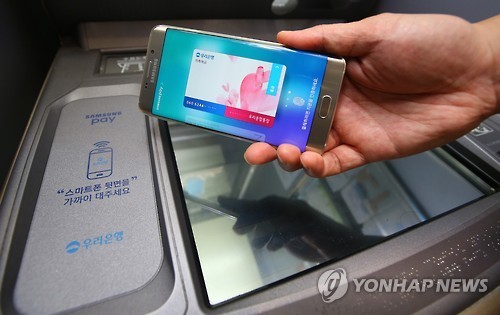Samsung Electronics on Thursday denied viral news reports that hacking attempts in March against LoopPay, the mobile payment solution provider for its Samsung Pay, led to a payment data leak in an attempt to ease consumers’ concerns over their privacy.
“The first thing to know is that Samsung Pay was not impacted by the LoopPay hack and at no point was any personal payment information at risk,” the tech giant said in a post on its official blog Thursday.
 |
A mobile user makes tries to pay using Samsung Electronics’ mobile payment system Samsung Pay. (Yonhap) |
The New York Times reported on Wednesday that LoopPay, which Samsung Electronics acquired last February, fell victim to a “sophisticated attack” by a group of government-affiliated Chinese hackers, known as the Codoso Group or Sunchock Group.
The Chinese hackers infiltrated the corporate network of the Massachusetts-based firm to allegedly steal the company’s magnetic secure transmission technology, which plays a key role in Samsung’s mobile payment system.
The MST allows Samsung Pay users to make purchases by simply waving the smartphones fitted with the mobile payment solution over conventional payment terminals.
Samsung’s mobile payment solution affiliate also played down the impact of the hack, saying the target of the attack was isolated to LoopPay’s office network which handles emails, file servers and printing.
“Despite the firm’s swift explanation about the ill-intended attempts, concerns are lingering as the hackers were able to get in and out of the LoopPay network for at least five months before the sneaky infiltration was detected belatedly in late August, and the specific damage had not been revealed yet,” a market official said.
An official from the Seoul-headquartered electronics firm said “all of LoopPay’s systems running on the affected network have been thoroughly examined and handled properly in a seamless manner.”
The Korean tech behemoth acquired the U.S. payment solutions developer in February for more than $250 million and Samsung Pay was launched in Korea and other global markets including the U.S. since September.
By Kim Young-won (
wone0102@heraldcorp.com)








